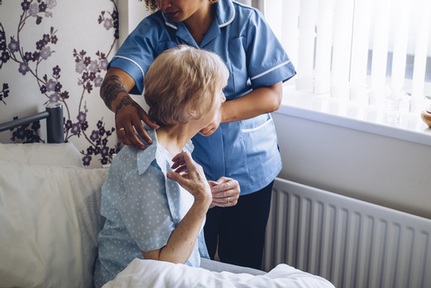Nearly half of home care providers warn care workers are leaving 'en masse' for better paid jobs
Nearly 50 per cent of home care providers have reported their care workers are seeking alternative jobs due to loss of pay while isolating due to Covid-19 as well as requesting an increase in mileage rate due to soaring petrol costs, according to new survey.

New research from the Homecare Association indicates an estimated 96 per cent of home care workers are receiving no pay or low pay whilst isolating after a positive Covid-19 test, following removal of the Infection Control and Testing Fund (ICTF) at the end of March 2022. Almost a fifth (18 per cent) said their care workers had resigned for this reason.
Furthermore, half of the respondents said care workers had requested an increase in the mileage rate, while more than a fifth (20 per cent) added care workers had either given notice, intended to look for work elsewhere or had already done so because they cannot afford to put fuel in their cars.
Homecare Association’s chief executive Dr Jane Townson said: “Why is anyone surprised that home care workers are resigning en masse when their income is insecure and inadequate, they don’t receive full sick pay and cannot afford to put fuel in their cars?
“Right at this time of heightened demand for home care, the government chose to allocate most available funding to the NHS, remove vital grant funding to help meet Covid-19 guidelines, and avoid recognising the impact of escalating fuel costs on home care delivery.”
'People are suffering, directly and indirectly'
Home care workers are leaving in droves for better paid jobs with more secure income, unable to cope with the escalating cost of living. The vacancy rate in home care is now 13.5 per cent, which is the highest ever recorded.
Unmet need in the community is increasing, ambulance response times are rising, operations are being cancelled and waiting lists are growing. Delay in discharging people from hospital back home due to lack of available home care and other community services is a key contributory factor. Lack of access to home care is also resulting in deteriorating health of older and disabled people, adding further pressure to the NHS.
“Many people are suffering, directly and indirectly, as there are not enough home care workers to meet need,” says Dr Townson. “Older and disabled people in the community, and their informal carers, are experiencing deteriorating health as they are going without support.
“Furthermore, many ambulance trusts and hospitals blame lack of availability of home care for inability to discharge and admit new patients swiftly, which has a knock-on effect on ambulance response times. NHS leaders say patients are dying every day from avoidable causes due to ambulance delays.”
'Adequate and sustained investment in home care' is needed
The survey which had responses from 292 home care providers across the UK during April 2022 also stated 61 per cent of home care providers said existing clients were still being supported, but new referrals were being declined due to the result of staff sickness or isolation.
Moreover, 11 per cent claimed that they were also handing work back and ending support for some existing clients.
Forty-one per cent of respondents claimed that due to sudden waves of staff absence (up to 30 per cent in some cases, though more typically up to 10 per cent), their cash flow had been affected, but they have still been able to cope.
A fifth of home care providers are reliant on using their reserves or a loan.
The Homecare Association is urging the government to pay for a temporary fuel allowance to cover the increased costs of fuel for vehicles needed to deliver home care, reinstate emergency Covid-19 funding for care workers to receive full sick pay when isolating and invest properly in home care so we can build capacity and reduce unmet need.
Dr Townson added: “Endless meetings at NHS England and the Department of Health and Social Care about workforce capacity won’t help. Adequate and sustained investment in home care will.”
Latest News
 29-Jul-24
Dementia Bus gives carehome.co.uk staff insight into life with dementia
29-Jul-24
Dementia Bus gives carehome.co.uk staff insight into life with dementia
 27-Jul-23
UK's top home care agencies in 2023 revealed
27-Jul-23
UK's top home care agencies in 2023 revealed
 30-Nov-22
A quarter of older people keep their falls secret from family
30-Nov-22
A quarter of older people keep their falls secret from family
 29-Nov-22
'Covid-19 has not gone away' say terminally ill
29-Nov-22
'Covid-19 has not gone away' say terminally ill
 28-Nov-22
IT consultant who received poor care opens 'compassionate' home care business
28-Nov-22
IT consultant who received poor care opens 'compassionate' home care business